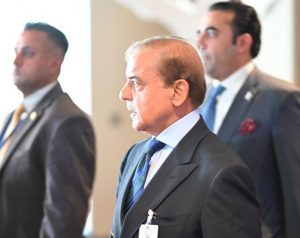The Prime Minister comes in to mend fences over the 150% executive allowance.
It is possible that this move may put an end to the ongoing debate regarding discrimination in compensation packages.

ISLMABAD: On Wednesday, Prime Minister Shehbaz Sharif took notice of the selective implementation of the federal cabinet’s decision by the Finance Ministry about the awarding of 150% executive allowance. This is a measure that may bring an end to an ongoing issue over discrimination in compensation packages.
According to those who took part in the federal cabinet meeting, Foreign Minister Bilawal Bhutto-Zardari brought up the matter of excluding certain civil service groups from the scope of the executive allowance as a topic of discussion.
As a result of going against the decision made by the cabinet, the 150% executive allowance was not given to the Foreign Service Group, along with the Economist Group, the Technical Group, the Information Service Group, or the Commerce and Trade Group.
According to the decision made by the cabinet, “the executive allowance will be granted to the officers working in the Federal Secretariat, President Secretariat, PM’s Office and ICT field administration at 1.5 times of the basic pay with effect from 1st July, 2022 in line with the allowance granted by all of the provincial governments.” This decision was made in accordance with the allowance that was granted by all of the provincial governments.
However, the Ministry of Finance published a specialised notification that primarily benefited two service groups at the expense of others. This was done in order to save money.
Since last Friday, the Economist Group has been participating in a pen-down strike. This strike is now having an effect on the functioning of the planning ministry, and it is also, to some extent, hindering the supply of essential information to the International Monetary Fund (IMF).
The matter of the 150% executive allowance has been sent by the prime minister to his secretary, who is tasked with determining the reasons why the decision of the cabinet should not be implemented in both text and spirit.
Officers from The Economist Group skipped a preliminary meeting for the flood repair and restoration plan that was held on Wednesday by the planning ministry.
In order for the International Monetary Fund Mission to visit Pakistan, the flood rehabilitation plan must first be completed.
According to a news statement that was issued after the meeting, the Ministry of Planning will share a comprehensive framework based on Resilient Recovery, Reconstruction, and Rehabilitation (4RFs) with the international partners the following week, before formally presenting it to the donor conference, which is scheduled to be held in January of the following year.
Planning Minister Ahsan Iqbal made the statement while presiding over a meeting with donors for the execution of 4RFs following the successful completion of Post-Disaster Needs Assessment (PDNA).
It is anticipated that the initial draught of the plan will be finalised the next week, and according to an official, the final version of the plan will be ready by the middle of December.
“The comprehensive framework will be shared with the partners the following week so that they can study it, and their valuable feedback will help the ministry to proceed further,” said the minister, while simultaneously encouraging the international partners to continue to support Pakistan in the rehabilitation phase of the process.
The Planning Commission, in conjunction with the World Bank, the Asian Development Bank (ADB), the United Nations Development Programme (UNDP), and the European Union, carried out the PDNA and issued a call for coordinated international support at the beginning of the previous month.
During the course of the meeting, the Planning Commission provided a comprehensive briefing to the attendees, focusing on the key indicators of the framework that was based on “Building Back Better.” The goal of this framework was to improve the participants’ livelihoods while simultaneously reducing their susceptibility.
In its presentation, the Planning Commission emphasised the long-term strategy, which includes a 10-year plan to implement 4RFs in 17 different sectors, primarily in infrastructure, education, and health, and which would be entirely based on climate resilience.
Since the PDNA was finished being written, the Ministry of Economic Affairs has also been in contact with the donors, and various meetings have taken place as a result.
According to the ministry of planning, the provinces will be responsible for carrying out the majority of the projects in their respective industries.
One of the exceptions is the ML-1 project, which is estimated to cost 10 billion dollars and would be carried out by Pakistan Railways.
The floods have had a significant negative impact on the condition of the train rails.
However, processing of these projects will be delayed until both the Economist Group and the Technical Group stop their strikes, which they have linked to the implementation of the decision made by the federal cabinet in both text and spirit.
In the most recent COP27 Climate Conference, which took place in Sharm El-Sheikh, Pakistan presented its argument and pleaded with the international community to support the nation despite the fact that Pakistan is responsible for less than 1% of the warming of the planet.










































